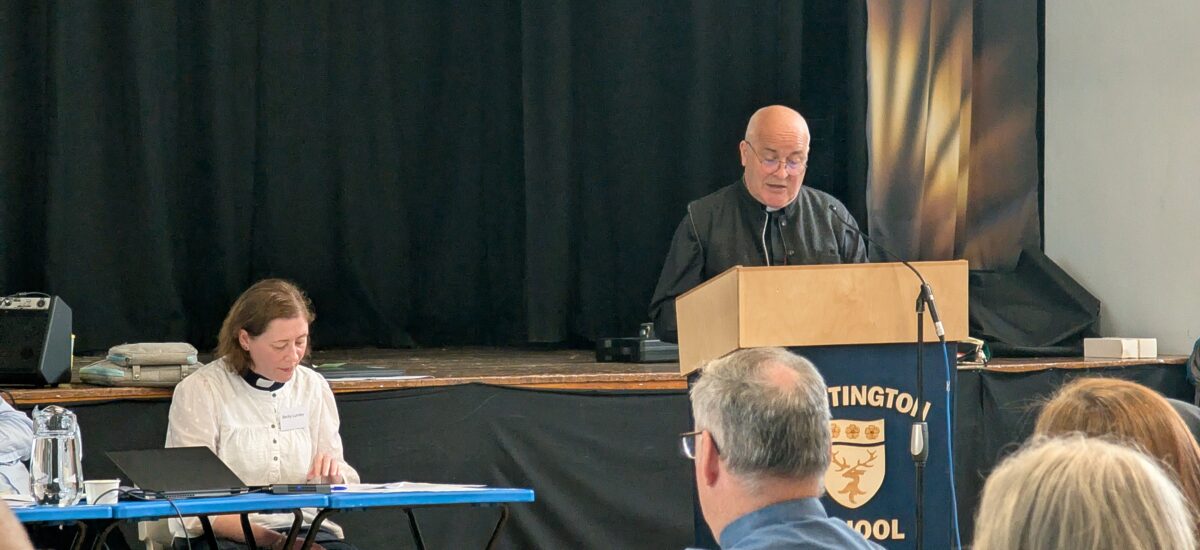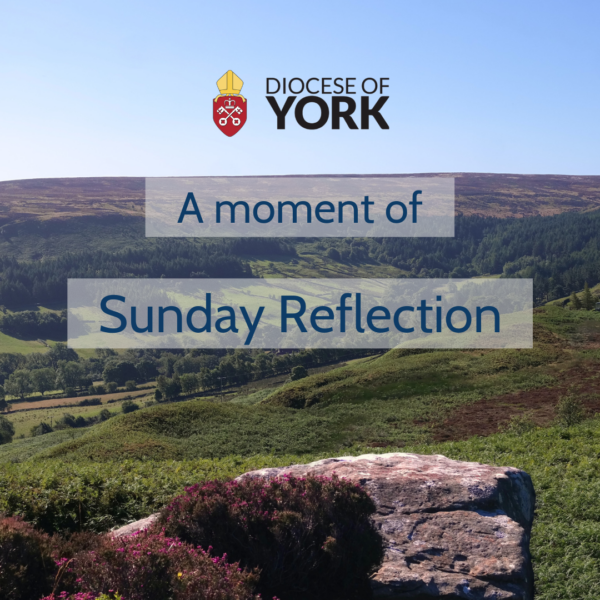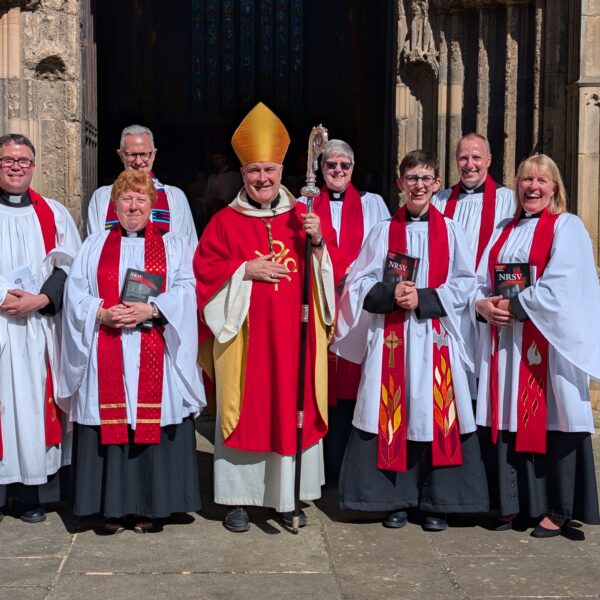Archbishop Stephen began by giving thanks for the lives of Helen Goodman and Richard Hare:
We remember with thanksgiving the lives of two members of our diocesan synod who have died since we first met. First of all, Helen Goodman from the deanery of Northern Ryedale who served on this synod for many years and will be known to many of us. She was a wonderfully faithful servant of her church, her deanery, and the diocese, and in particular was very involved in Holy Rood House.
We remember also Richard Hare, Vicar of Emmanuel in Bridlington, who died on 23rd May. We knew he was ill, but he went downhill and died very, very quickly. He was due to be made Honorary Canon of the Cathedral in June. I think many of us knew Richard really well. He was a wonderful human being and a wonderful parish priest. During his time, Emmanuel in Bridlington saw really significant growth, and at the same time a really strong commitment to the marginalised and the poor in Bridlington. He was central to the establishment of Hope Housing in Bridlington, purchasing two houses in the deanery to support homeless people. It was as area dean and under his leadership that a deanery plan was created. He was just such a wonderful person.
We’ll keep a few moments of silence to remember before God in thanksgiving, Helen and Richard, for the contribution they made to the life of the Church. They lived and died in the faith of Jesus Christ. We commend them to God.
Loving God, our heavenly father, we thank you Helen and for Richard. We pray for their families and friends and the churches where they served, and for all who mourn. May they rest in peace and rise in glory.
This year, I celebrated – or perhaps ‘marked’ would be a more accurate word to describe it – 21 years as a bishop. Every time I license a new priest, or do something formal and legal, I am reminded of my longevity – when I say at the end of every legal document: ‘the 21st year of my consecration and of my translation, the 5th‘.
21 years ago, the issue convulsing the Church, and a painful and testing situation I found myself thrust into, was Jeffrey John withdrawing as Bishop-designate of Reading. A replacement was needed. I was asked to take on the role. On the day my appointment was announced, the press conference at Reading Minster. The press conference lasted two hours and was live streamed on television. 21 years ago, being – or not being – the Bishop of Reading was a big story. The church was divided on how to receive and celebrate the presence in our congregations and the ministry of people in stable, committed same-sex relationships. I answered a lot of questions that day, committing myself to be a bishop for all the people in parishes of the Reading episcopal area and saying I believed that this was not an issue that should divide the Church; that I respected and valued the conscientiously-held theological convictions of those who saw the issue differently; and even dared to believe that if we could find ways of living across this difference, it would be a tremendous gift, not just for the Church, but to a far too easily divided and conflicted world. One detail of the story that it is good to have the opportunity to put on public record 21 years later, is that Jeffrey John himself also issued a press statement that day, graciously welcoming my appointment and wishing me well in my ministry. This didn’t get media coverage. It didn’t fit the narrative. But it showed what a good and godly man Jeffrey John is.
During the intervening 21 years, the Church has, as we well know, continued to wrestle and debate with these issues. There have been numerous occasions, too numerous to number, when people have said to me, “If only we could stop talking about sex and human sexuality and get on with the real business of preaching the gospel.” Of course, I understand what they mean, and of course, I long for us to arrive at a point where those differences we live with can happily coexist in a diverse, but still united Church. But I’ve always also said that actually, this is the real business of preaching the gospel. The gospel of Jesus Christ is about breaking down barriers of separation, confessing our sinfulness and our need of God, and seeking God’s way for our lives and for the life of the world, living in that new humanity, as Paul describes it, which God has won for us in Christ through Christ’s dying and rising.
Sisters and brothers, the Bible is clear on this: we are each of us fearfully and wonderfully made. We are all precious to God. God has a purpose for everyone’s life. God does not make mistakes. Each of us is made in God’s image. Therefore, we must debate and wrestle, for we know that sexual orientation is part of who we are and how God has made us, and therefore we must ensure that every church is a place of welcome for every person, and we have a responsibility to discern what form that welcome should take. It is here we find ourselves in painful disagreement.
In the recent debates under the heading Living in Love and Faith, we have reached a position where the House of Bishops has commended Prayers of Love and Faith for use in existing, regular church services for stable, committed same-sex couples to receive prayers of blessing. Not prayers of blessing on the union itself, but recognising the many goods that are clearly evident in people’s lives, the Church can gladly bless these people and pray for them and thus enable them to feel more fully part of a Church which has so often excluded and rejected them and where, in the past, and I fear sometimes in the present, there is prejudice and homophobia.
As I think most of you know, I support this development of Prayers of Love and Faith. However, while I also know it is not enough for many people in our Church, it is too far for others who, because of their theological conviction, do not want to exclude people of same-sex relationships from their church, but do not feel able to offer the Prayers of Love and Faith. As you will hear later, I want the Diocese of York to know that I and my colleagues, Bishop Flora, Bishop Barry and Bishop Eleanor, will support and defend the right of clergy in the York Diocese to use the Prayers of Love and Faith according to the House of Bishops’ guidelines, or not to use them. This is a matter of theological conviction and conscience. If you choose not to use them, it does not mean you are being prejudiced or homophobic. If you choose to use them, it does not mean you have abandoned biblical truth and historic tradition. These prayers are what are sometimes called a ‘pastoral accommodation’, i.e., they acknowledge the pastoral reality of good and faithful people in same-sex relationships in our congregations and offer prayer for them. Some churches and some clergy will use them. Some won’t. We have no doubt – what we are absolutely committed to in this diocese, is enabling this to happen in a way that holds together the unity of the Church across our diversity of opinions so that every parish can flourish.
The Living in Love and Faith process is not yet complete. Some final proposals will be brought to the February 2026 meeting of the General Synod. This will probably include proposals for what are often called ‘bespoke services’, i.e., the same Prayers of Love and Faith, but this time used in a standalone service, rather than as part of an existing service. For some people this will be a step too far, since they are concerned that whatever the prayers themselves say, such a bespoke service will look like a wedding service, and, of course, the Church of England is not at the moment – or indeed I don’t think in the very near future – proposing to enable same-sex marriage to take place in church. Therefore, with proper guidelines, though of course we all need to see the details, I can imagine supporting these bespoke services. But I also realise it increases anxiety for clergy who are opposed to these developments, and they wonder what provision they will receive if they consider themselves to be out of step with their bishop or their diocese on something which, from their perspective, seems to fundamentally threaten the Church of England’s doctrine of marriage. I understand this concern. The Church of England’s Faith and Order Commission will be publishing a paper very soon on this issue and this will shape the debate in General Synod, not least around what provision may or may not be needed. In the meantime, various proposals have been discussed though, no proposal has yet been agreed in the House of Bishops. Nevertheless, dear York Diocese, working closing with all of my colleagues, and all of you, we will do all that we can to ensure that every parish can flourish, whatever their theological conviction. We will continue to support those who use the prayers, and those who in conscience do not.
I’m not going to try now to second guess exactly where we will be February. I welcome the documents offering theological underpinning for our decision-making. They will be available soon and I rather wish we had had them earlier. But there we are. As ever, I will continue to be guided by my reading of scripture, my discernment of the theological advice, and my concern for the unity of the Church, which means actually that my views haven’t changed much over 21 years. I continue to dare to believe that if we can find ways of living together with our conscientious disagreement, this will not only be good for the Church, but good for the world. No one in the York Diocese needs to feel that they must sacrifice their deeply held theological conviction. But nor do we need to retreat into parallel jurisdictions which end up creating churches within churches. Rather, what we need is proper and consistent safeguards of conscience and pastoral provision which enable us to flourish, but also to continue to live together as Christ’s body, the Church, within the diocese and across our differences.
Our discussions today will feed into the wider discernment process of the Church of England. Primarily they are for us in our diocese, as we work out what we need to navigate our way through our disagreements. Because one of the things I love and value so much about our diocese, as I look around the room and know that there is a great variety of views here, we have shown ourselves able to respect each other’s conscience. To try, even, to get inside each other’s shoes and to deal with each other courteously and respectfully. And therefore, I approach this still, as I did 21 years ago, with great hopefulness. We can agree that it is God’s Church not ours, and that we cannot choose who is our fellow disciple, and that all of us want to be the Church for everyone.
As was the case when we last discussed these matters a year or so ago, I am confident that our conversations this morning will be gracious and courteous. But I know that these discussions touch on deeply held convictions and I’m also mindful that for some of us in the room it is our own identity which feels under discussion. Let us then love one another, let us seek the mind of Christ, and let us be in no doubt: each of us is very welcome in the house of God.


